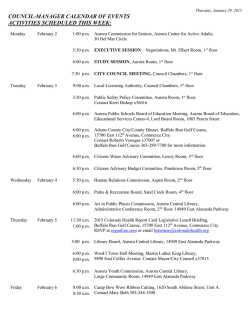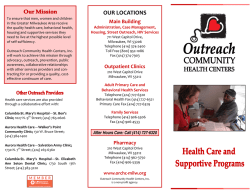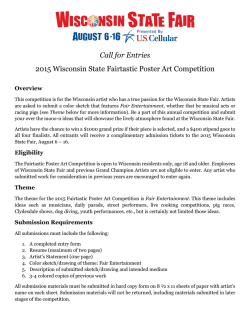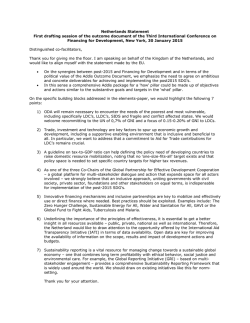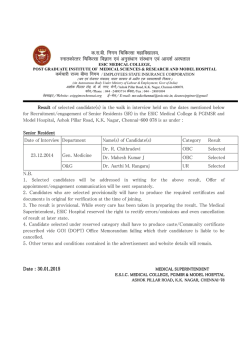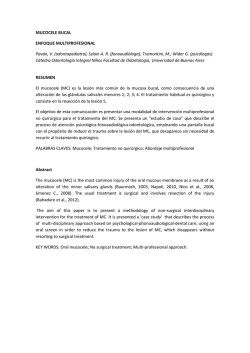
Link to Brochure - Academic Event Management
PRESENTED BY: PRST STD US POSTAGE PAID MILWAUKEE WI PERMIT NO 5590 Location Aurora Research Institute Aurora Sinai Medical Center Campus Milwaukee Heart Institute Building 960 N. 12th Street, Lower Level Milwaukee, WI 53233 Local airport: General Mitchell International Airport (MKE) Hotel Reservations A block of rooms has been reserved at: Milwaukee Marriott Downtown 323 E. Wisconsin Avenue • Milwaukee, WI 53202 Call 877-224-1990 and mention the “6 Pillar Course” (M-1RN9XVF) to get a special rate of $145 per night, plus taxes. Cutoff date to get the special rate is January 14, 2015. Transportation will be provided each day from the Marriott Hotel to the course. Hotel rooms include complimentary internet. Introducing ... Refunds Mail completed enrollment form to: 6 Pillar Approach No refunds will be given if a registration is cancelled. However, tuition can be rolled over to the next course. Academic Event Management reserves the right to cancel, discontinue or reschedule this program at any time and will assume no financial obligation to the registrants in the event of a cancellation. In case of cancellation, registration fees will be refunded in full. Academic Event Management 1396 Rancho Lane • Thousand Oaks, CA 91362 T 805-300-9154 • F 805-494-1103 To register online, go to www.academiceventmanagement.com Parafascicular Surgery of the White Matter Attire Course and Course Dinner: Business Casual Registration With emphasis on: Economic Resource Optimization Through Surgical Biometrics The 6 Pillar Approach for Comprehensive Management of Subcortical Lesions February 6-7, 2015 February 6-7, 2015 Institution (Area code) Business Phone (Area code) Business Fax _______________________________________________________________________________________ Email Dietary Restrictions:_____________________________________________________________________ Payment o Check enclosed (Payable to: Academic Event Management) o Visa o MasterCard o Discover o American Express _______________________________________________________________________________________ Card No. Expiration Date _______________________________________________________________________________________ Signature In accordance with the Americans with Disabilities Act, Aurora Health Care seeks to make sure this conference is accessible to all. If you have a disability that might require special accommodations, please contact Pat Fitzwater at 805-300-9154. 960 N. 12th Street, 4th floor Milwaukee, WI 53233 _______________________________________________________________________________________ Introducing ... _______________________________________________________________________________________ AddressCity Province/State Postal/ZIP Code 6 Pillar Approach Name (First, Middle, Last) Course Director: Amin B. Kassam, MD Vice President, Neurosciences • Medical Director, Neurosurgery Aurora St. Luke’s Medical Center • Milwaukee, Wisconsin Milwaukee, Wisconsin Degree _______________________________________________________________________________________ Parafascicular Surgery of the White Matter Specialty Aurora Research Institute Aurora Sinai Medical Center Campus Milwaukee Heart Institute Building 960 N. 12th Street, Lower Level Milwaukee, WI 53233 February 6-7, 2015 _______________________________________________________________________________________ Economic Resource Optimization Through Surgical Biometrics Space is limited! Please print clearly. With emphasis on: Tuition: $995 ACCREDITED BY: aurora.org/ANII Description The 6 Pillar Approach is the result of a recent convergence of technologies to manage abnormalities affecting the intraaxial subcortical white matter space. This confluence of technologies has led to development of minimally invasive strategies via progressively smaller surgical corridors to reach and treat abnormalities in a targeted manner. Integration of these technologies is driven by a need to establish clinical and economic value in the delivery of precise targeted treatment in an efficient manner. This value is articulated through Surgical Biometrics. A recorded surgical demonstration of The 6 Pillar Approach for parafascicular surgery of the white matter will be shown, and participants may interact with the surgeons and other members of the faculty. The course features a hands-on simulation lab session. Target audience: Neurosurgeons, neuroradiologists and neurologists interested in developing further knowledge of subcortical intraaxial space and white matter tractography, surgical biometrics and resource optimization. 23 (lesser efficiency) Aurora Faculty Eric Alenius, MBA Director, Distribution Aurora Health Care Milwaukee, Wisconsin Guest Faculty Mohamed Labib, MDCM, FRCS (C) University of Ottawa Ottawa, Ontario • Canada Ronald L. Young II, MD Director Pediatric Neurosurgery St. Vincent Indianapolis Indianapolis, Indiana At the conclusion of the course, participants should be able to: Parafascicular Surgery of the Subcortical Intraaxial Space •A ppraise and integrate the evolving technology platforms of white matter fascicular image interpretation and trajectory planning and subcortical anatomy •A ssess principles and techniques of optimum cannulation pathways – Parafascicular Surgery •A nalyze the advantages (depth of field and tissue differentiation) of the Exoscope •A pply the techniques of automation to improve performance curves and efficiency during resection phase for both MIS and conventional craniotomy corridors •A pply techniques to optimize tissue capture and viability •E xamine the limitations of corridor brain port approaches • Interpret the value of the 6 Pillar parafascicular approach in comparison to other forms of surgical interventions •E xamine the efficiency factors that impact Surgical Biometrics analysis 6:45 a.m.Shuttle Departs from The Marriott Hotel 7:00 Registration and Breakfast 7:15 Welcome and Housekeeping 7:30 Overview – A Systems Approach: Principles Integrating the 6 Pillars for Parafascicular Approach for White Matter Minimally Invasive Subcortical Surgery a. Image Interpretation d. Optics b. Dynamic White Matter Navigation e. Automated Resection c. Atraumatic Access f. Regenerative Tissue Therapy Bruce Radcliff, MBA Director, Sourcing Strategy Aurora Health Care Milwaukee, Wisconsin John Wlodarski, MD Attending Anesthesiologist Aurora St. Luke’s Medical Center Milwaukee, Wisconsin Agenda Friday, February 6 Neil Guenther, MD Attending Anesthesiologist Aurora St. Luke’s Medical Center Milwaukee, Wisconsin Objectives • Examine the current immune-targeted molecular treatments available and the potential ability to deliver these in situ – “The 6th Pillar” 27 (greater efficiency) microdissection automated manual Conflict of Interest Disclosure Statement It is the policy of Aurora Health Care Office of Continuing Education to ensure balance, independence objectivity, and scientific rigor in all of its sponsored education activities. All participating faculty, course directors, and planning committee members are required to disclose to the program audience any financial relationships related to the subject matter of this program. Disclosure information is reviewed advance in order to manage and resolve any possible conflicts of interest. All faculty and planning committee members have attested that their financial relationships do not affect their ability to present well-balanced evidence-based content for this activity. Specific disclosure information for each course faculty will be shared with the audience prior to the faculty’s presentation. Accreditation Aurora Health Care is accredited by the Wisconsin Medical Society to provide continuing medical education for physicians. Aurora Health Care designates this live activity for a maximum of 15 AMA PRA Category 1 CreditsTM. Physicians should claim only the credit commensurate with the extent of their participation in the activity. Acknowledgement This course is supported in part by educational grants from the following companies at press time: • Hitachi Aloka Medical, Ltd. • KARL STORZ Endoscopy-America • KLS Martin Group • NICO Corporation • Synaptive Medical Inc. Use of the NICO BrainPath is limited to the following indication for use: To provide access and visualization of the surgical field during brain and spinal surgery. BrightMatter Navigation is pending 510k clearance. Not available for commercial use in U.S. BrightMatter Planning is cleared for sale in the U.S. and Canada. 9:00 Principles Image Interpretation: a. Physics of Diffusion Weighted Imaging b. Clinical Applications of Diffusion Weighted Tumor Detection c. Physics of Diffusion Tensor Imaging d. Clinical Applications of Diffusion Tensor Imaging 10:30 Break 10:45 Surgical Applicable Scaffold for White Matter Anatomy: An Anatomic Substrate for Surgical Corridors and Access 11:30 Principles of Access and Cannulation 12:00 p.m. Lunch 12:30 Simulation: a.Real-Time Volumetric 3D Simulation and Integrated Trajectory Planning and Navigation b. Segmentation/Scaffolding White Mater Anatomy 1:00 Lab 1: Hands-On Volumetric Software White Matter Planning 2:30 Lab 2: Skills Lab: a. Access/Cannulation b. Optics c. Automated Global Position Systems d. Automated Resection Techniques 4:30 Regenerative Medicine and Tissue Harvest – Primer on Existing Pharmacotherapy and Progenitor/Stem Cell Therapy 5:15 End of Day 1 – Shuttle Departs to The Marriott Hotel 6:45 Shuttle Departs from The Marriott Hotel to Dinner (Meet in Hotel Lobby) 7:00–10:30 Course Dinner – Wisconsin Club, 900 W. Wisconsin Avenue Saturday, February 7 7:15 a.m. Shuttle Departs from The Marriott Hotel 7:30Breakfast 8:00 White Matter Anatomic Review 8:30 Intracerebral Hemorrhage and the Role of Surgical Management: MiSPACE Trial 9:00 Surgical Biometrics: Principles of Value Added Analysis & Hospital Efficiency/ Patient Flow: Eric Alenius, MBA and Bruce Radcliff, MBA 9:45 Outcomes/Complications/First Case Selection Matrix: Mohamed Labib, MDCM, FRCS (C) 10:15 Anesthesia for Awake Craniotomies: Neil R. Guenther, MD and John C. Wlodarski, MD 10:30 Lab 3: Hands on Advanced Volumetric White Matter Planning and Simulation 12:00 p.m. Course Adjourns – Shuttle Departs to The Marriott Hotel (Boxed Lunch) 12:00-2:00Optional Lab 4: Skills Lab (Please RSVP for This Session if you Wish to Stay for Additional Lab Time) Description The 6 Pillar Approach is the result of a recent convergence of technologies to manage abnormalities affecting the intraaxial subcortical white matter space. This confluence of technologies has led to development of minimally invasive strategies via progressively smaller surgical corridors to reach and treat abnormalities in a targeted manner. Integration of these technologies is driven by a need to establish clinical and economic value in the delivery of precise targeted treatment in an efficient manner. This value is articulated through Surgical Biometrics. A recorded surgical demonstration of The 6 Pillar Approach for parafascicular surgery of the white matter will be shown, and participants may interact with the surgeons and other members of the faculty. The course features a hands-on simulation lab session. Target audience: Neurosurgeons, neuroradiologists and neurologists interested in developing further knowledge of subcortical intraaxial space and white matter tractography, surgical biometrics and resource optimization. 23 (lesser efficiency) Aurora Faculty Eric Alenius, MBA Director, Distribution Aurora Health Care Milwaukee, Wisconsin Guest Faculty Mohamed Labib, MDCM, FRCS (C) University of Ottawa Ottawa, Ontario • Canada Ronald L. Young II, MD Director Pediatric Neurosurgery St. Vincent Indianapolis Indianapolis, Indiana At the conclusion of the course, participants should be able to: Parafascicular Surgery of the Subcortical Intraaxial Space •A ppraise and integrate the evolving technology platforms of white matter fascicular image interpretation and trajectory planning and subcortical anatomy •A ssess principles and techniques of optimum cannulation pathways – Parafascicular Surgery •A nalyze the advantages (depth of field and tissue differentiation) of the Exoscope •A pply the techniques of automation to improve performance curves and efficiency during resection phase for both MIS and conventional craniotomy corridors •A pply techniques to optimize tissue capture and viability •E xamine the limitations of corridor brain port approaches • Interpret the value of the 6 Pillar parafascicular approach in comparison to other forms of surgical interventions •E xamine the efficiency factors that impact Surgical Biometrics analysis 6:45 a.m.Shuttle Departs from The Marriott Hotel 7:00 Registration and Breakfast 7:15 Welcome and Housekeeping 7:30 Overview – A Systems Approach: Principles Integrating the 6 Pillars for Parafascicular Approach for White Matter Minimally Invasive Subcortical Surgery a. Image Interpretation d. Optics b. Dynamic White Matter Navigation e. Automated Resection c. Atraumatic Access f. Regenerative Tissue Therapy Bruce Radcliff, MBA Director, Sourcing Strategy Aurora Health Care Milwaukee, Wisconsin John Wlodarski, MD Attending Anesthesiologist Aurora St. Luke’s Medical Center Milwaukee, Wisconsin Agenda Friday, February 6 Neil Guenther, MD Attending Anesthesiologist Aurora St. Luke’s Medical Center Milwaukee, Wisconsin Objectives • Examine the current immune-targeted molecular treatments available and the potential ability to deliver these in situ – “The 6th Pillar” 27 (greater efficiency) microdissection automated manual Conflict of Interest Disclosure Statement It is the policy of Aurora Health Care Office of Continuing Education to ensure balance, independence objectivity, and scientific rigor in all of its sponsored education activities. All participating faculty, course directors, and planning committee members are required to disclose to the program audience any financial relationships related to the subject matter of this program. Disclosure information is reviewed advance in order to manage and resolve any possible conflicts of interest. All faculty and planning committee members have attested that their financial relationships do not affect their ability to present well-balanced evidence-based content for this activity. Specific disclosure information for each course faculty will be shared with the audience prior to the faculty’s presentation. Accreditation Aurora Health Care is accredited by the Wisconsin Medical Society to provide continuing medical education for physicians. Aurora Health Care designates this live activity for a maximum of 15 AMA PRA Category 1 CreditsTM. Physicians should claim only the credit commensurate with the extent of their participation in the activity. Acknowledgement This course is supported in part by educational grants from the following companies at press time: • Hitachi Aloka Medical, Ltd. • KARL STORZ Endoscopy-America • KLS Martin Group • NICO Corporation • Synaptive Medical Inc. Use of the NICO BrainPath is limited to the following indication for use: To provide access and visualization of the surgical field during brain and spinal surgery. BrightMatter Navigation is pending 510k clearance. Not available for commercial use in U.S. BrightMatter Planning is cleared for sale in the U.S. and Canada. 9:00 Principles Image Interpretation: a. Physics of Diffusion Weighted Imaging b. Clinical Applications of Diffusion Weighted Tumor Detection c. Physics of Diffusion Tensor Imaging d. Clinical Applications of Diffusion Tensor Imaging 10:30 Break 10:45 Surgical Applicable Scaffold for White Matter Anatomy: An Anatomic Substrate for Surgical Corridors and Access 11:30 Principles of Access and Cannulation 12:00 p.m. Lunch 12:30 Simulation: a.Real-Time Volumetric 3D Simulation and Integrated Trajectory Planning and Navigation b. Segmentation/Scaffolding White Mater Anatomy 1:00 Lab 1: Hands-On Volumetric Software White Matter Planning 2:30 Lab 2: Skills Lab: a. Access/Cannulation b. Optics c. Automated Global Position Systems d. Automated Resection Techniques 4:30 Regenerative Medicine and Tissue Harvest – Primer on Existing Pharmacotherapy and Progenitor/Stem Cell Therapy 5:15 End of Day 1 – Shuttle Departs to The Marriott Hotel 6:45 Shuttle Departs from The Marriott Hotel to Dinner (Meet in Hotel Lobby) 7:00–10:30 Course Dinner – Wisconsin Club, 900 W. Wisconsin Avenue Saturday, February 7 7:15 a.m. Shuttle Departs from The Marriott Hotel 7:30Breakfast 8:00 White Matter Anatomic Review 8:30 Intracerebral Hemorrhage and the Role of Surgical Management: MiSPACE Trial 9:00 Surgical Biometrics: Principles of Value Added Analysis & Hospital Efficiency/ Patient Flow: Eric Alenius, MBA and Bruce Radcliff, MBA 9:45 Outcomes/Complications/First Case Selection Matrix: Mohamed Labib, MDCM, FRCS (C) 10:15 Anesthesia for Awake Craniotomies: Neil R. Guenther, MD and John C. Wlodarski, MD 10:30 Lab 3: Hands on Advanced Volumetric White Matter Planning and Simulation 12:00 p.m. Course Adjourns – Shuttle Departs to The Marriott Hotel (Boxed Lunch) 12:00-2:00Optional Lab 4: Skills Lab (Please RSVP for This Session if you Wish to Stay for Additional Lab Time) Description The 6 Pillar Approach is the result of a recent convergence of technologies to manage abnormalities affecting the intraaxial subcortical white matter space. This confluence of technologies has led to development of minimally invasive strategies via progressively smaller surgical corridors to reach and treat abnormalities in a targeted manner. Integration of these technologies is driven by a need to establish clinical and economic value in the delivery of precise targeted treatment in an efficient manner. This value is articulated through Surgical Biometrics. A recorded surgical demonstration of The 6 Pillar Approach for parafascicular surgery of the white matter will be shown, and participants may interact with the surgeons and other members of the faculty. The course features a hands-on simulation lab session. Target audience: Neurosurgeons, neuroradiologists and neurologists interested in developing further knowledge of subcortical intraaxial space and white matter tractography, surgical biometrics and resource optimization. 23 (lesser efficiency) Aurora Faculty Eric Alenius, MBA Director, Distribution Aurora Health Care Milwaukee, Wisconsin Guest Faculty Mohamed Labib, MDCM, FRCS (C) University of Ottawa Ottawa, Ontario • Canada Ronald L. Young II, MD Director Pediatric Neurosurgery St. Vincent Indianapolis Indianapolis, Indiana At the conclusion of the course, participants should be able to: Parafascicular Surgery of the Subcortical Intraaxial Space •A ppraise and integrate the evolving technology platforms of white matter fascicular image interpretation and trajectory planning and subcortical anatomy •A ssess principles and techniques of optimum cannulation pathways – Parafascicular Surgery •A nalyze the advantages (depth of field and tissue differentiation) of the Exoscope •A pply the techniques of automation to improve performance curves and efficiency during resection phase for both MIS and conventional craniotomy corridors •A pply techniques to optimize tissue capture and viability •E xamine the limitations of corridor brain port approaches • Interpret the value of the 6 Pillar parafascicular approach in comparison to other forms of surgical interventions •E xamine the efficiency factors that impact Surgical Biometrics analysis 6:45 a.m.Shuttle Departs from The Marriott Hotel 7:00 Registration and Breakfast 7:15 Welcome and Housekeeping 7:30 Overview – A Systems Approach: Principles Integrating the 6 Pillars for Parafascicular Approach for White Matter Minimally Invasive Subcortical Surgery a. Image Interpretation d. Optics b. Dynamic White Matter Navigation e. Automated Resection c. Atraumatic Access f. Regenerative Tissue Therapy Bruce Radcliff, MBA Director, Sourcing Strategy Aurora Health Care Milwaukee, Wisconsin John Wlodarski, MD Attending Anesthesiologist Aurora St. Luke’s Medical Center Milwaukee, Wisconsin Agenda Friday, February 6 Neil Guenther, MD Attending Anesthesiologist Aurora St. Luke’s Medical Center Milwaukee, Wisconsin Objectives • Examine the current immune-targeted molecular treatments available and the potential ability to deliver these in situ – “The 6th Pillar” 27 (greater efficiency) microdissection automated manual Conflict of Interest Disclosure Statement It is the policy of Aurora Health Care Office of Continuing Education to ensure balance, independence objectivity, and scientific rigor in all of its sponsored education activities. All participating faculty, course directors, and planning committee members are required to disclose to the program audience any financial relationships related to the subject matter of this program. Disclosure information is reviewed advance in order to manage and resolve any possible conflicts of interest. All faculty and planning committee members have attested that their financial relationships do not affect their ability to present well-balanced evidence-based content for this activity. Specific disclosure information for each course faculty will be shared with the audience prior to the faculty’s presentation. Accreditation Aurora Health Care is accredited by the Wisconsin Medical Society to provide continuing medical education for physicians. Aurora Health Care designates this live activity for a maximum of 15 AMA PRA Category 1 CreditsTM. Physicians should claim only the credit commensurate with the extent of their participation in the activity. Acknowledgement This course is supported in part by educational grants from the following companies at press time: • Hitachi Aloka Medical, Ltd. • KARL STORZ Endoscopy-America • KLS Martin Group • NICO Corporation • Synaptive Medical Inc. Use of the NICO BrainPath is limited to the following indication for use: To provide access and visualization of the surgical field during brain and spinal surgery. BrightMatter Navigation is pending 510k clearance. Not available for commercial use in U.S. BrightMatter Planning is cleared for sale in the U.S. and Canada. 9:00 Principles Image Interpretation: a. Physics of Diffusion Weighted Imaging b. Clinical Applications of Diffusion Weighted Tumor Detection c. Physics of Diffusion Tensor Imaging d. Clinical Applications of Diffusion Tensor Imaging 10:30 Break 10:45 Surgical Applicable Scaffold for White Matter Anatomy: An Anatomic Substrate for Surgical Corridors and Access 11:30 Principles of Access and Cannulation 12:00 p.m. Lunch 12:30 Simulation: a.Real-Time Volumetric 3D Simulation and Integrated Trajectory Planning and Navigation b. Segmentation/Scaffolding White Mater Anatomy 1:00 Lab 1: Hands-On Volumetric Software White Matter Planning 2:30 Lab 2: Skills Lab: a. Access/Cannulation b. Optics c. Automated Global Position Systems d. Automated Resection Techniques 4:30 Regenerative Medicine and Tissue Harvest – Primer on Existing Pharmacotherapy and Progenitor/Stem Cell Therapy 5:15 End of Day 1 – Shuttle Departs to The Marriott Hotel 6:45 Shuttle Departs from The Marriott Hotel to Dinner (Meet in Hotel Lobby) 7:00–10:30 Course Dinner – Wisconsin Club, 900 W. Wisconsin Avenue Saturday, February 7 7:15 a.m. Shuttle Departs from The Marriott Hotel 7:30Breakfast 8:00 White Matter Anatomic Review 8:30 Intracerebral Hemorrhage and the Role of Surgical Management: MiSPACE Trial 9:00 Surgical Biometrics: Principles of Value Added Analysis & Hospital Efficiency/ Patient Flow: Eric Alenius, MBA and Bruce Radcliff, MBA 9:45 Outcomes/Complications/First Case Selection Matrix: Mohamed Labib, MDCM, FRCS (C) 10:15 Anesthesia for Awake Craniotomies: Neil R. Guenther, MD and John C. Wlodarski, MD 10:30 Lab 3: Hands on Advanced Volumetric White Matter Planning and Simulation 12:00 p.m. Course Adjourns – Shuttle Departs to The Marriott Hotel (Boxed Lunch) 12:00-2:00Optional Lab 4: Skills Lab (Please RSVP for This Session if you Wish to Stay for Additional Lab Time) PRESENTED BY: PRST STD US POSTAGE PAID MILWAUKEE WI PERMIT NO 5590 Location Aurora Research Institute Aurora Sinai Medical Center Campus Milwaukee Heart Institute Building 960 N. 12th Street, Lower Level Milwaukee, WI 53233 Local airport: General Mitchell International Airport (MKE) Hotel Reservations A block of rooms has been reserved at: Milwaukee Marriott Downtown 323 E. Wisconsin Avenue • Milwaukee, WI 53202 Call 877-224-1990 and mention the “6 Pillar Course” (M-1RN9XVF) to get a special rate of $145 per night, plus taxes. Cutoff date to get the special rate is January 14, 2015. Transportation will be provided each day from the Marriott Hotel to the course. Hotel rooms include complimentary internet. Introducing ... Refunds Mail completed enrollment form to: 6 Pillar Approach No refunds will be given if a registration is cancelled. However, tuition can be rolled over to the next course. Academic Event Management reserves the right to cancel, discontinue or reschedule this program at any time and will assume no financial obligation to the registrants in the event of a cancellation. In case of cancellation, registration fees will be refunded in full. Academic Event Management 1396 Rancho Lane • Thousand Oaks, CA 91362 T 805-300-9154 • F 805-494-1103 To register online, go to www.academiceventmanagement.com Parafascicular Surgery of the White Matter Attire Course and Course Dinner: Business Casual Registration With emphasis on: Economic Resource Optimization Through Surgical Biometrics The 6 Pillar Approach for Comprehensive Management of Subcortical Lesions February 6-7, 2015 February 6-7, 2015 Institution (Area code) Business Phone (Area code) Business Fax _______________________________________________________________________________________ Email Dietary Restrictions:_____________________________________________________________________ Payment o Check enclosed (Payable to: Academic Event Management) o Visa o MasterCard o Discover o American Express _______________________________________________________________________________________ Card No. Expiration Date _______________________________________________________________________________________ Signature In accordance with the Americans with Disabilities Act, Aurora Health Care seeks to make sure this conference is accessible to all. If you have a disability that might require special accommodations, please contact Pat Fitzwater at 805-300-9154. 960 N. 12th Street, 4th floor Milwaukee, WI 53233 _______________________________________________________________________________________ Introducing ... _______________________________________________________________________________________ AddressCity Province/State Postal/ZIP Code 6 Pillar Approach Name (First, Middle, Last) Course Director: Amin B. Kassam, MD Vice President, Neurosciences • Medical Director, Neurosurgery Aurora St. Luke’s Medical Center • Milwaukee, Wisconsin Milwaukee, Wisconsin Degree _______________________________________________________________________________________ Parafascicular Surgery of the White Matter Specialty Aurora Research Institute Aurora Sinai Medical Center Campus Milwaukee Heart Institute Building 960 N. 12th Street, Lower Level Milwaukee, WI 53233 February 6-7, 2015 _______________________________________________________________________________________ Economic Resource Optimization Through Surgical Biometrics Space is limited! Please print clearly. With emphasis on: Tuition: $995 ACCREDITED BY: aurora.org/ANII
© Copyright 2026
